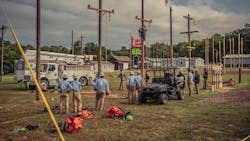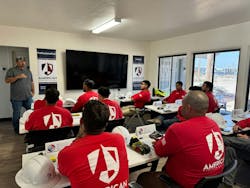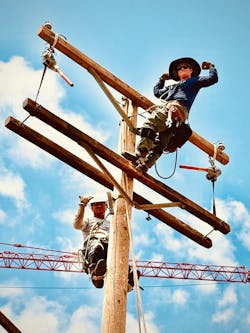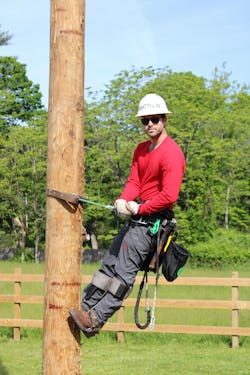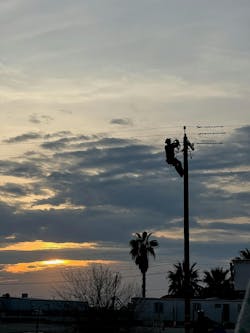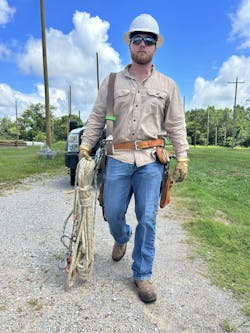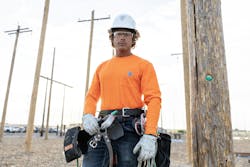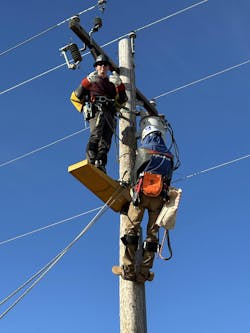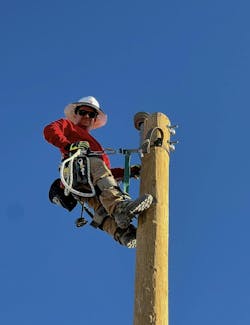How Training Programs Are Shaping the Future of the Utility Workforce
Key Highlights
- Training programs like L.I.N.E. and American Lineman College focus on safety, climbing, electrical theory, and equipment operation to prepare students for the demands of the trade.
- Industry leaders emphasize the importance of mentorship, hands-on experience, and modern technology integration to develop competent and safety-conscious lineworkers.
- Opportunities for career advancement include roles in troubleshooting, system operations, and leadership, with pathways supported by internships, early hiring, and specialized certification programs.
- Students come from diverse backgrounds, including firefighting, oil fields, and military service, demonstrating the trade's accessibility and appeal to a wide range of individuals seeking meaningful work.
- The industry is evolving with smart grid technologies, drones, and digital tools, making safety and adaptability critical skills for future lineworkers.
Listen to Part 1 of this Audio Story in the ICYMI Series for the Line Life Podcast
Tune in to Part 2 Featuring the Stories of the Pre-Apprentices
For years, electric utilities managed large workforces, but as experienced lineworkers began to retire, a growing concern emerged about how to replace their invaluable, hard-won knowledge. Utilities established internal training programs and hired new individuals, but due to the unique challenges of line work — combining fears of heights and electricity — not all candidates succeeded.
As the older generation continues to retire, the demand for new lineworkers remains high, said John “Matt” Horan, an instructor at the Lineman Institute of the North East (L.I.N.E.), a 15-week pre-apprentice electrical lineman trade school in Kingston, New York. After working as a journeyman lineworker, Horan is helping aspiring lineworkers to hit the ground running when they enter apprenticeship programs.
“Mentoring students and witnessing them overcome mental and physical obstacles has been the most rewarding aspect of my career in the line trade,” Horan said. “I am incredibly proud to be shaping the next generation of lineworkers.”
Exploring Opportunities for Pre-Apprentices in the Trade
Jon Backman, a 25-year journeyman lineworker and electric response troubleman, said currently, the opportunity to work in the trades is wide open.
“The electrical industry has been a wonderful provider for myself, my family and countless others, and demand is high for well-trained, safe and effective workers,” he said. “I would encourage any young person who wants to contribute to their community in a rewarding and meaningful way to consider the electrical trades.”
Due to the continued investment in grid modernization and the retirement of a large portion of the utility workforce in the near future, opportunities in the line trade are strong and growing, especially for well-trained lineworkers, said Don Finn, an instructor in Electric Utility Technology/Powerline at Des Moines Area Community College (DMACC) in Ankeny, Iowa.
“Students entering the field today have access to competitive wages, excellent benefits, opportunities to travel or stay local and clear pathways for advancement into leadership, troubleshooting or system operations roles,” Finn said.
To continue to build their field workforce, utilities and contractors are actively recruiting from training programs and are offering internships, ride-alongs and early hiring options. For example, at DMACC, students can get a head start and gain foundational skills in safety, climbing, rigging, pole-top rescue and electrical theory — all of which are essential for success in an apprenticeship, Finn said.
“Students graduate with certifications, hands-on experience and a clear understanding of the trade’s demands, making them more competitive for openings,” Finn said. “Utilities and co-ops often view program graduates as ‘apprenticeship-ready,’ which can shorten the time it takes to get hired and to succeed in the field.”
Training today blends traditional hands-on learning with new technologies like augmented reality, 3D models and digital simulations to help students visualize equipment and practice procedures safely.
“Programs now emphasize troubleshooting, communications, teamwork and resilience — all critical in today’s complex and interconnected utility grid,” Finn said. “The overall approach is more multi-modal, inclusive and aligned with the needs of modern utilities.”
Learning in the Classroom and Training in the Field
To break into the trade, some up-and-coming lineworkers are enrolling in pre-apprenticeship programs and vocational and technical programs nationwide. From coast to coast, students can learn the fundamentals of the line trade before they even step foot into a utility’s apprenticeship program. These programs give future lineworkers a glimpse into the line trade and empower students to determine whether a career on the line is a good fit before they are hired on as an apprentice and set out on the path to become a full-fledged journeyman lineworker.
For example, at Utilitrain, a 15-week Electrical Lineman Program, students learn about basic electricity, electric systems, rigging, personal protective grounding, transformer theory and career planning and strategies. In addition, they engage in simulator training to learn how to safely operate digger derricks and excavators.
“We believe that every lineman should learn and understand basic electricity to fully comprehend the nature of the business before entering the serious business of line work,” said Randy Beckes, a lead trainer. “After graduation, students will know how the electrical distribution system works and be familiar with electric company equipment, trucks and specialized tooling to be fully ready their first day on the job.”
Case in point: Ethan Gaz, a recent Utilitrain graduate from Charlestown, Maryland, started his new job the day after graduation, and he encouraged others to consider the training program.
“They have a good group of trainers who know what they are doing,” Gaz said. “It was a fun and very educational experience.”
To continue their education following graduation, young lineworkers can enlist in apprenticeship programs or different types of transmission and distribution programs.
“This will help to further them along in their careers and increase their knowledge along with their pay,” Beckes said. “Specialized programs in high-voltage transmission barehand and hot sticking programs are available to those who want to keep climbing the ladder of success.”
While each pre-apprenticeship and vocational program is structured differently, the L.I.N.E. program gives students a strong grasp on climbing, power line construction, electrical theory and equipment operation. In addition, they earn their commercial driver’s license and become trained in both CPR and First Aid, equipping them for future careers in the line trade. Horan said some students must overcome their fear and uncertainty of climbing wood poles and working at heights, but that is where the instructors come in.
“They train and push the students beyond their comfort zones,” he said. “After mastering basic climbing skills, students advance to building our own distribution system in our training yard.”
Horan said utilities, unions and contractors are seeking individuals committed to a long-term career in line work, and the L.I.N.E program provides that solid foundation.
“We are confident that our pre-apprentices enter the workforce with a comprehensive understanding of the daily operations and expectations of a working line crew,” Horan said.
Taking a Different Approach
The American Lineman College, a specialized training program in southern California, is also preparing pre-apprentices for careers in the line trade. Unlike other 15-week programs, which may include 4.5 hours of classroom instruction and two to three hours of hands-on skills training per day, American Lineman College students complete their coursework online, giving them more time in the field, where they are immersed in a simulated work environment.
“We’ve disrupted how the pre-apprentice line school model is delivered to students,” said Joe Wiley, chief learning officer for American Lineman College. “Our class sizes are small, with a very targeted learning approach for adult learners. Cultivating a diverse and skilled workforce, American Lineman College actively recruits and trains individuals from under-represented communities, preparing them for essential roles that power our nation.”
The high cost of traditional vocational schools, along with the need to move away from home for extended periods, were two significant barriers to entry into the power delivery industry for most people, Wiley continued.
“We’ve been able to shatter those barriers and make line school achievable,” Wiley said. “Our students are finding employment in this highly competitive field and achieving success. It’s a beautiful thing to be a part of.”
The following stories shine the spotlight on seven recent and current students in pre-apprenticeships and lineworker training programs at vocational schools and community colleges. They hail from different parts of the nation, but they all have one thing in common — their desire to one day work in the line trade and power their communities.
Bryy Marriott: Learning on the Line in Los Angeles
Bryy Marriott of Buena Park, California, earned the Lineworker Scholarship from Edison International, giving her the opportunity to train at the line mechanic program at the Los Angeles Trade Technical College (LATTC). She was inspired to work in the line trade by her father, who used to work for Southern California Edison (SCE) and PAR Electrical Contractors, and her uncle, who is still working as a lineman for SCE.
While at LATTC, her classes started at 7 a.m. After spending about an hour learning about electrical theory, she and other students performed physical training on the soccer field or headed straight to the pole yard. Most days, her class would climb and learn how to use different types of rigging or set up double cross arms.
“One of the biggest challenges is that nothing can really prepare you physically to learn how to climb,” Marriott said. “You use different muscles that you didn’t even know you had. One of my favorite things about training was realizing I was stronger than half the boys in my class, even at the age of 35.”
In her class, she mostly used basic hand tools like drills, shovels, nuts and bolts. Over the years, she said the line trade has made some innovative speed wrenches and stripping tools and made advancements in safety equipment.
“The safety equipment used to climb has definitely changed over the years and is more innovative,” Marriott said. “We use a lot more safety equipment while climbing than before. They used to free climb, whereas now we use a primary safety line while we climb.”
She recently graduated from the training program, and she’s about to obtain her Class A driver’s license, which she’ll need to work for SCE and most utilities.
“The end goal is to become a journeyman lineman, but everybody starts as a groundman or a helper, and I'm already on my way to reaching that goal,” she said.
Marriott considers LATTC as one of the best lineman training programs in California.
“The instructors are top notch, and I wish the incoming trainees the best of luck,” she said. “Also, always look out for your brothers and sisters on the job. You couldn’t do it without them.”
Matthew Miller: Wildland Forest Firefighter to New York Pre-Apprentice
Matthew Miller, a pre-apprentice at L.I.N.E. in New York, transitioned from a career in wildland forest firefighting to learning the line trade for a more financially secure future.
“I had conversations with others who made a career out of line work, and they all spoke highly of the trade,” Miller said. “I decided it was the best move for myself and my family.”
Now enrolled in the L.I.N.E. program, he and his fellow students start school at 7 a.m. in the classroom to review readings from the assigned chapters for the week. Next, his class moves down to the training yard to perform their morning exercises, called “up-downs,” and then shifts into skills training. For example, he is learning to use the digger and crane to dig and set poles, which has been very beneficial.
While other pre-apprentices may be hesitant about working at heights, he said climbing is his favorite part of the training, and he looks forward to using this skill during a future apprenticeship program. He said some of the challenges involve the complexities of the job.
“There is an abundance of information that is crucial to learn in order to stay safe on the job,” he said.
Horan said Miller has become fully immersed in both classroom learning and hands-on training in the program.
“His eagerness to ask insightful questions and his readiness to tackle new tasks showcase his unwavering commitment to learning the trade,” Horan said. “Once he masters a task, he humbly offers assistance to those who are struggling. I foresee a bright future for him in any area of electrical distribution.”
Miller is now applying for apprentice lineworker positions, and he is looking forward to joining a company in the near future. He said he is glad that he decided to first enroll in the pre-apprenticeship training before going out into the world of line work.
“The Linemen Institute of the North East is a fantastic program that allows the student to grow and learn in a short time period,” he said. “Also, the instructors give you the knowledge you need to succeed and stay safe in a trade that can easily be unsafe.”
Klarence Pilkington: Oil Fields to Climbing Poles in California
Back in 2014, Klarence W. Pilkington was working in the oil fields with all four of his brothers. He eventually became a member of the International Brotherhood of Electrical Workers (IBEW) and is now a student at American Lineman College in Bakersfield, California.
“I started learning and really loving the trade,” he said.
On a typical day, he shows up early to get water jugs ready and the trucks stocked before learning new ways and techniques from his two instructors.
“I am super grateful I have had the opportunity to attend American Lineman College and be able to get taught by Mr. Wiley and Mr. Saraceni,” he said. “They've made me realize things I would never have even thought about before I went to campus. I believe this trade should have more professional linemen like them. They are extremely professional, and anyone who gets the opportunity to attend campus should take it and soak up all the knowledge they have to give.”
He said the training today is likely different than in past years due to a shift in the safety culture.
“A lot of the classic linemen talk about free climbing and not wearing FR clothing, which is foreign to the ears of the newer guys coming up,” he said.
Pilkington discovered a lot of new tools and technologies in the program, and he sees the trade evolving rapidly in the future. At the same time, he also learned it takes more than just the physical training and skills to succeed as a lineworker — it also requires certain characteristics.
“If you stay humble, work hard and have a great attitude, it will take you far in this trade,” he said. “I’ve also learned you need to be a good leader and have integrity.”
He is also aware of the round-the-clock nature of the job as a lineworker and the need to travel to respond to storms and work opportunities.
“I will be able to travel and see new scenery, although it can be rough on my family,” he said. “My beautiful wife and daughters understand everything I go through, and that every hardship is for my family.”
After completing the training program, he plans to complete his orientation for Mountain States Line JATC. One day, he may even start a training program of his own.
“I would love to journey out and start my own training facility so I can teach the young people who are up and coming in the trade,” he said.
Wyatt McCauley: Studying High-Voltage Work in Oklahoma
Wyatt McCauley, a pre-apprentice in the high-voltage training program at the Oklahoma State University Institute of Technology (OSUIT) in Okmulgee, Oklahoma, discovered the line trade from a family friend.
“He has been a lineman for years, and he told me it would be perfect for me,” he said.
McCauley said his favorite part about training is working as a team to get a task accomplished, and the most significant challenge is safety.
“The biggest challenges I face are keeping my head on right and thinking of my safety, and for everyone around me to make sure we get the job done with no one getting hurt,” he said.
Through the training program, McCauley learns the basics of line work through a blend of classroom training and hands-on work in the yard. Each week, he and the other apprentices tackle a different topic and hands-on project in the field. He is currently running a digger truck and bucket truck, and he said the new bucket trucks are helping lineworkers to work faster, more efficiently, and most importantly, more safely.
“Line work is still the same when it comes to how everything is wired and framed and the techniques that are used,” he said. “It is different today because we have bucket trucks and better safety equipment, so we can approach jobs in a safer manner.”
In the future, he would like to pursue his journeyman’s license after he graduates from the training program.
“I will reach this goal by showing up to work every day and absorbing as much knowledge as I can,” he said.
Weston Fabian: Preparing for a Future Career as a Troubleman
Northwest Lineman College (NLC) has four campuses nationwide, but Weston Fabian chose to attend the Electrical Lineworker Program in his home state of Idaho.
“A friend of mine from the Marine Corps spoke very highly of it and encouraged me to look into it,” he said. “I also did a ride-along with a local utility and spoke to a retired lineman, who urged me to attend NLC. During his entry into the trade, there was very little training or structure for apprentices. Almost all the learning was done on the job, and there were not many safety regulations or rules.”
He said NLC was the remedy to that — he and his classmates learned the fundamentals and basic foundations, safety rules and a basic structure to how the trade works. While his training was different than that of the retired lineworker, he said the job of a lineworker has essentially stayed the same throughout the years.
“Many of the tools are almost exactly the same as they were 50 or 60 years ago, many of the methods of doing the work are the same as well,” he said.
Every morning, he gets to school early to review material, spend four hours in the classroom, take a break for lunch and then spend the afternoon in the field using practical hands-on skills.
“There’s always more to do, so when class ends, there’s plenty to study, help out with or practice in the field if you truly want to excel in the program,” Fabian said.
He said the challenges of the training are the early mornings, late evenings and being out in the elements doing work —whether it’s 30 deg or 103 deg.
“My favorite part is that challenge and hardship, along with all the work and learning you put in,” he said. “It makes me feel accomplished and fulfilled.”
At NLC, he is learning about new technologies, and he said his favorite new smart grid device is a recloser.
“It can help to solve a short-term fault quickly and efficiently without knocking out an entire community’s power until a serviceman can arrive,” he said. “I just spoke with a small co-op where they plan on purchasing and installing one in order to address a hot spot area of the community.”
He said equipment like reclosers, smart meters and SCADA help to pinpoint problems, expedite troubleshooting and restore power more rapidly.
“I believe we will see a surge of smart technology and the usage of drones to help make the job safer and more efficient in the coming years,” he said.
In the future, he hopes to get hired on by a public utility or cooperative where he can complete an apprenticeship and learn enough over the years to become a troubleman or serviceman.
“I think I attended a very well-planned and comprehensive program at NLC,” he said. “I was pretty impressed with how professional and intense it was at times. I think it’s given me a ton of tools to help get started in the trade, including how and where I may find an apprenticeship, what to expect and how to be successful when I begin one as well.”
He said he can’t wait to join the line trade and start on the path to his career as a lineworker.
“If you speak to any career lineman, they will tell you they love their trade, and it’s not going away or even slowing down anytime soon,” he said. “I believe them 100 percent.”
AJ Bruns: Following in His Family’s Footsteps in Iowa
With family members who work in the trade, AJ Bruns was always interested in being a lineworker growing up.
“I love operating the equipment, climbing and building things,” he said. “I enjoy being outdoors and solving problems.”
As a student at Des Moines Area Community College (DMACC), he learned about better ways to do tasks such as building, fixing and wrecking line and operating various machinery used in the line trade. Some days, the students performed difficult tasks that required more time and effort, like scenario training and replacing a broken pole.
Bruns is also learning about the new electric tools and how they work, as well as the different technologies used in the trade, like Viper breakers and SCADA. He says electric hoists and lighter tools like crimpers, staple guns and impacts are helping lineworkers to improve productivity and safety.
After graduating from the program, he is now an apprentice at Midland Power Constructors. He said he is glad he decided to complete a pre-apprenticeship program to start out his career in the line trade.
“I thought my training program was awesome, and I would recommend it to anyone,” he said.
Justin Gonzales: Looking to Work on the Line in California
With a desire to follow in his brother’s footsteps, Justin Gonzales enrolled in the American Lineman College training program in California.
“I want to make a difference every day for those in need of power and be a part of the ever-evolving power industry,” he said.
“It’s great to have the one-on-one teaching,” he said. “With our class sizes, it was greatly helpful to have the instructors right there with you, teaching and guiding you with everything we needed.”
With access to special resources in the classroom, the students were able to learn and soak up information as if they were already in the trade. For example, they discovered how to gather information to complete a job or task correctly on their iPads.
“We would do things that you would encounter in the real world,” he said.
Through his training, he learned that safety is of utmost importance in the line trade along with staying updated on technology and tools.
“There are so many real-world things changing or updating from solar farms to car chargers to the ever-changing power systems,” he said. “Technology is what we have to lean on, but the tools we are using are changing as well, so we have to make sure they are up to date and able to do the job. You must adapt every day for what that day may bring you — no day is the same.”
He said American Lineman College fully equipped him with the proper learning and fundamentals for him to succeed in the line trade and for the work that is out there.
“I’m three days out of completing all my training for Southern California Edison, and I have reached a goal that I have had for a lifetime,” he said. “I would not be in this position if it was not for American Lineman College teaching me all the groundman fundamentals and what is needed for the line trade.”
He said he is proud to soon work as a groundman for SCE and feels like, after being properly trained, lineworkers should hold themselves high.
“As a groundman, you are eyes for those on the pole and the ground,” he said. “You are your brother’s keeper. I feel safety is a very important topic in this industry, so the groundman role is just as important as those up on the pole.”
Where to Go for More Info
Across the country, individuals interested in the line trade can discover a training program that works for them, their budget and their schedule. To find lineman training programs near you, go to linemancentral.com/locations. Here is more information about the training programs mentioned in this article.
American Lineman College: This training program, located in Bakersfield, California, lasts from 10 to 16 weeks and offers online academic instruction and weekend classes to fit varying schedules. Founded by Mike Hennesy, one of the honorary founders of Northwest Lineman College (NLC), American Lineman College offers three programs: the Certified Utility Worker Program, Climbing Certification and Class A CDL course. In the utility worker program, students learn to work on a simulated crew. The students practice assembling, loading and preparing line equipment, digging holes, setting poles and operating utility equipment. Upon completion, the students are certified for entry-level groundman and utility worker positions. Through the climbing certification, students learn how to climb over obstacles, install crossarms and rig from an elevated position. Learn more at lineman-school.com.
Des Moines Area Community College (DMACC): The Electric Utility program, which can be completed in 12 months, teaches students to learn how to work with underground and overhead electrical distribution systems and gain skills to install and maintain transmission systems. In addition, the pre-apprentices can earn credits to apply to a formal apprenticeship, reduce time achieving journeyman-level status and prepare for leadership positions in the field. Details are available at dmacc.edu
Linemen Institute of the North East (L.I.N.E.): This pre-apprentice electrical lineman trade school in Kingston, New York, offers a 500-hour training program. Over the course of 15 weeks, students earn the following credentials: digger truck operations, commercial driver’s license, First Aid and CPR, OSHA 10-hour and pole top rescue. The program was started by Donald Leiching, who spent 25 years in the line trade. To apply for the spring 2026 program, go to linemaninstitute.com.
Los Angeles Trade-Technical College (LATTC): Within its construction, maintenance and utilities division, LATTC offers the Powerline Mechanic (Lineman) program. Students learn how to identify problems with overhead and underground power line equipment; analyze and solve routine technical problems related to electrical technology and power distribution; and install, maintain and remove power poles, transformers, structures and other utility equipment. The students who earn the Edison International Lineworker Scholarships train at LATTC. Visit LATTC at lattc.edu/academics/aos/powerline-mechanic.
Northwest Lineman College (NLC): NLC, which was founded in 1993, has four campuses nationwide in Idaho, California, Texas and Florida. The 15-week pre-apprentice Electrical Lineworker Program gives students the opportunity to obtain certifications in aerial lift rescue, climbing, chainsaw safety and maintenance, CPR, digger derrick safety, enclosed space rescue, First Aid and pole-top rescue. Graduates also earn the OSHA 10-hour T&D and can add on courses such as applied mathematics, NCCCO crane operator certification training and Class A Commercial Driver’s License training. Go to lineman.edu for further details.
Oklahoma State University Institute of Technology (OSUIT): The intensive two-year high-voltage program provides students with comprehensive, hands-on experience in the high-voltage field lab. Students can gain practical skills, including electrical pole climbing and working safely with live wire technology. The curriculum covers a wide range of topics, from electrical and transformer theory to substation operations. A critical component of the program is the required internship, which places students in real-world settings for on-the-job training. The participants engage in four paid, company-sponsored internships to gain practical experience and “earn while they learn.” Once the students complete the program, they earn an associate’s degree in in applied science in high voltage line technician. Go to https://osuit.edu/academics/degrees-programs/high-voltage.html to find out more.
Utilitrain: This 15-week program, located in Elkton, Maryland, consists of classroom training and field competencies. For example, the students learn about basic electrical theory, how to perform proper grounding techniques and how to drive and operate commercial vehicles. During the program, the students practice climbing poles, working on transformers and rigging. They also learn about career planning and strategies such as the different structures of various companies, how to create an effective cover letter and resume and interview for a position in the field. Visit utiltrain.org.
About the Author
Amy Fischbach
Electric Utilities Operations
Amy Fischbach is the Field Editor for T&D World magazine and manages the Electric Utility Operations section. She is the host of the Line Life Podcast, which celebrates the grit, courage and inspirational teamwork of the line trade. She also works on the annual Lineworker Supplement and the Vegetation Management Supplement as well as the Lineman Life and Lineman's Rodeo News enewsletters. Amy also covers events such as the Trees & Utilities conference and the International Lineman's Rodeo. She is the past president of the ASBPE Educational Foundation and ASBPE and earned her bachelor's and master's degrees in journalism from Kansas State University. She can be reached at [email protected].
